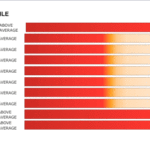My late Aunt Sylvia Cox was an inspiration to me. She was not only my Aunt, she was a teacher at my High School. Her enthusiasm for life and her naturally exclamatory style engendered a sense of fun and a sense of the possible in those around her. Whether it was taking us for “puddle rides” in her ancient Morris Minor Traveller which involved swerving alarmingly across country lanes to hit puddles of water that would splash up through the hole in the floor of the car, or fitting 3 adults and 2 children into a Lancia Fulvia 2+2 sports car for a 3 hour drive to the Pleasure Beach at Blackpool, she was always innovative and fun.
When soon after retiring she was diagnosed with cancer she decided to keep in touch with her friends and family around the world using Skype. She was the person who introduced Skype to me when she called me on it and told me! She also used Skype to keep us all informed of her progress, which may have been difficult for her, but was something I was very grateful for. I am proud that a techboy like me was introduced to a new technology by his retired and ill Aunt. It spoke volumes about her attitude to her terminal illness.
In many ways the passing of Steve Jobs reminded me of the similarities between my Aunt and the CEO of Apple. They both faced questions of who to tell and when and how about their condition. And they both used I.T. as part of that communication strategy. I never thought my memories of my Aunt would be modified or linked in any way with Steve Jobs, which just goes to show how a person’s memory and life continues to grow and inspire one years after their passing.
For those still in the workplace living with a diagnosis of a terminal or chronic condition, not only do they have to deal with their emotional response to their condition, they have the very real dilemma of deciding what to tell their boss and work colleagues. Not everyone will want to be as open as my Aunt was with her colleagues, friends and family.
There are two ways of looking at this situation, the formal or legal one, and the career development approach. I have no ?legal training and so what I can say about this from a formal perspective is limited and readers are strongly advised to take advice from appropriately qualified independent legal advisors. If you are a member of a union, they should be able to assist.
The first point to make is that you have a duty to notify promptly your employer of your illness or incapacity and of the estimated duration of the absence as a condition of any sick leave you are going to take. Employers have a right to demand an explanation for unexplained absences from work, indeed I am told by lawyers that it could be argued that under Occupational Health and Safety laws employers who do not inquire into absences may be abdicating their duty of care to their employees. Consequently you should expect management to request information about any absences.
Ok, so much for the formalities, how in practice can you maximise the chances of keeping your job while at the same time dealing with the emotional shock and upheavals that accompany a diagnosis of a chronic or terminal condition??The first point hardly needs making it is so obvious, but you are likely to be in a highly emotionally charged state around the time of medical investigations and diagnosis. When under such stress, we do not make the best decisions, and understandably our focus is on ourselves, our well-being and our loved ones. The employer generally ranks very low?in our priority list, however the remuneration they provide may well rank as important. Consequently you need to give yourself the best chance possible of communicating clearly with your employer. Try writing out or talking out with a sensible friend, what you want to tell your employer. This will help you collect your thoughts and communicate?more coherently when the time comes. Take a little time to gather your thoughts about work and to decide on your strategy.
Do not be tempted to quit in an emotional state. Think through your actions. If you are going to require the financial support of a regular income during the course of your illness, the stresses of continuing to work need to be balanced against the stresses of being unemployed and being financially insecure. Even if you do not need to work?for the money, think very carefully about the sense of social support, recognition and social contribution that can accompany work. Do not throw away such things lightly.
Despite your personal circumstances, the reality is that work goes on for your employer, and they have a responsibility to their other employees, customers and shareholders. Consequently, you might want to consider framing your discussions with your employer in terms of how you are going to continue to meet performance expectations. Do not be tempted to personalise the situation or become resentful if the employer seems to be coldly indifferent to your circumstances. If your goal is to continue to make a professional contribution, then you need to behave professionally. You are likely to be treated a whole lot better if you maintain a dignified and supportive approach to your colleagues and boss, than if you simply “trade” on your illness.
Openness in communication with your manager is an essential for most people at work. Understand the nature and course of your diagnosis and ask your medical advisors about how your illness and treatment is likely to affect your performance at work. Test yourself so that you are fully confident you know as much about the impact of your illness as possible and remember there are no stupid questions if you do not know ask your doctor and ask again for clarification it is part of their job. When you fully understand the nature of your illness, plan out how you see this translating into your work situation. How long realistically will you be able to continue with your duties? What modifications to your duties or workplace will be required, when and for how long? What are the realistic best and worst case scenarios relating to?work? Once you have set out these parameters you are in a good position to have a meeting with your manager, where you can set out all of this information for them.
If your condition is one that is not likely to impact upon your work or your work colleagues, or not for a long time, then your condition is not a work-related issue at this stage and there is no obvious reason to inform your managers about it. However if your condition is going to impact upon your work, or is going to be plainly obvious to your managers and colleagues you should not delay in discussing the matter with your boss.
You need to decide on a preferred “communications policy”. In other words, you need to decide who you want to share?your diagnosis with. Some people will prefer to limit knowledge of their condition to a manager and no one else, whereas others will want the information disseminated more broadly. You need to discuss this with your manager and make it very clear what your preference is. Remember your manager may well have an obligation to report your case?to their superiors and so on.
Even if you have close friends in the workplace, your boss should still be the first (or a very close second) work colleague you inform. The last thing you want are rumours starting and your boss hearing second- hand. Your goal is to get your boss on-side as a supporter. Schedule a meeting at a quiet time, such as the end of the day or early morning when there is less chance of interruptions. Indicate that you want to discuss something of importance, and that you will need at least 30 mins to an hour. Indicate that you need to see them reasonably urgently. After the meeting, follow up with an email, or a note (keep copies of either), politely thanking them for their time and setting out briefly your understanding of what was discussed and what was agreed.
My golden rule of all communications is to get it in writing. Keep a dated written record of all meetings, and communications with people at work. Write up notes as soon as possible after face-to-face meetings or even?corridor conversations, and date them. Keep the records up to date and limit your entry to the facts of what occurred do not include any defamatory opinions or reflections. If someone reduced you to tears, say so, but do not write down a lot of personal attacks about the other person. Why go to all this trouble? Simply to cover yourself in the?event that the employer becomes unreasonable or reneges on an agreement.
If you fear that being open with your boss is likely to result in your sacking, it is likely that your boss would also sack you for any regular or long absences for treatment, so unless the impact of your illness is not going to impact on your work, you have little to lose in informing your boss (and lots to gain, because you are actually helping your boss to manage you better).
Finally, I have known cases where the most irritating, anti-establishment employees who were convinced their boss hated their guts, found after diagnosis of a terminal illness that the boss became their greatest supporter. Most people (and that includes most bosses!) are compassionate, reasonable people, but like most people, they can be cold-hearted or unreasonable if approached in the wrong way. Be honest, be proud and be positive. Nobody and no employer could ask for more.
(Dedicated to the memory of my Aunt Sylvia Cox)
Related Posts











Pingback: Tweets that mention Working with a terminal illness | The Factory -- Topsy.com